With Bengaluru Urban district recording 1,280 COVID-19 cases on March 23, the city has been witnessing a sharp rise in its spread.
With two young people in Ballari testing positive for the South African variant of COVID, the Karnataka government has begun tightening up its safety measures.
In Bengaluru, the BBMP has been asked to ramp up its testing to 40,000 RT-PCR tests per day. However, so far only about 37,000 tests are carried per day and the BBMP Commissioner says that the lag is a result of people’s reluctance to get tested. BBMP continues to ensure through its team of marshals that citizens continue to mask up and maintain social distancing.
Read more: How’s the COVID scenario in Bengaluru now?
With the vaccination process underway, there have also been instances of citizens letting their guard down and also their masks.
A recent NY Times article, indicated that the world over, scientists are uncertain about when vaccinated people can ditch their masks in public spaces. They say it would depend on how quickly the rates of disease drop and what percentage of people remain unvaccinated in the surrounding community.
Scientists do not know whether vaccinated people spread the virus to those who are unvaccinated. While most COVID vaccines may be good at shielding people from severe illness and death, the research is unclear on exactly how well they stop the virus from taking root in an immunised person’s nose and then spreads to others. Also, researchers are of the opinion that it’s not uncommon for a vaccine to forestall severe disease but not infection. Inoculation against the flu, rotavirus, polio and others are all imperfect in this way.
I spoke with experts, citizens, RWAs and establishments about what they are doing to keep COVID at bay.
Months away from normalcy: Epidemiologist
Closer to home, Dr Giridhar Babu, Epidemiologist, Technical COVID Task Force, Government of Karnataka, warns that the “vaccination is no reason to let the guard down.
“The infection is in the air and an imminent second wave too. Even if one has had the vaccine, there is no certainty that he or she would not contract the virus or be a carrier. This risk exists at least until a majority of the population is vaccinated. We are a good 5-6 months away from returning to absolute normalcy. Stay masked and practice social distancing, please!” advises Dr Giridhar.
Super spreader events
Parties and large gatherings, especially in enclosed places are super spreader events and can create clusters of COVID infection.
The unfortunate incident of over 100 people testing positive in SNN Raj Lake View in the Bommanahalli Zone last month is a classic case in point. The apartment complex had allowed eight families to host a party in the apartment’s common party hall, thanks to which approximately 10 per cent of the total number of residents tested positive in the following days. This is excessive especially when the city average is lower than 10 percent.
Dr Giridhar adds that “with theatres, schools, and colleges reopening up in full capacity, masking must become compulsory or else the spread of infection won’t stop. Self regulation is extremely important at this stage.”
Ensuring timely assistance
Another area of concern is large crowds and queues for vaccination at hospitals and Public Health Centres. The worry has been around senior citizens since they fall in the high risk category.
Read more: “How my parents got their vaccine shots”
Dr Giridhar says “the vaccination process must be well organised.” Citizens can come forward to help the Government of Karnataka (GoK) to set up a helpline and tech platform to make the process seamless and so that people can be at the hospital at specific timings allotted to them instead of having to wait long and unpredictable hours in large crowds.”
Last year, we saw the birth of several novel initiatives — grocery and essentials delivery, hospital pick up and drops, helplines numbers, etc — which now seem to have faded away with time.
“Cab aggregators will help make a difference by picking up and dropping off senior or disabled citizens. GoK should definitely take the help of citizens and establishments” to anchor such initiatives, Dr Giridhar suggests.
In a recent announcement, Uber India pledged Rs 10 crore towards the second phase of the vaccination drive, for free rides to senior citizens.
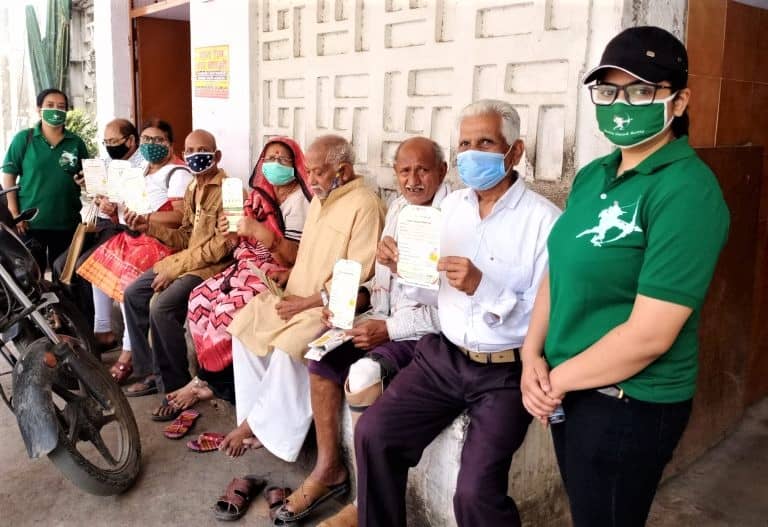
Rustom Bagh Welfare Association
Rustom Bagh is a well connected community with over 2,000 residents.
At the start of the pandemic the RWA ensured that people got the opportunity to shop with less risk. There is only one grocery shop in the area. The residents spoke to the shop owners, who cooperated, and ensured no one was allowed to go to the shops until the shop was thoroughly sanitised. After 18 hours, with sanitisation complete, the shops opened. The RWA ensured that only three people were at the counter, fully masked and maintaining a safe distance.
The residents painted squares on the roads for people to stand in a queue at a safe distance. The RWA also placed volunteers who regulated the citizens as they stood outside the shop for an hour each. From 7:30 am to 7:30 pm, at least two citizen volunteers were placed at the shop.
The residents made sure all wore masks and used the sanitiser provided by the shop. If a building within the RWA reported a COVID case, information was put out on the community WhatsApp group without disclosing identities. Arrangements were made to ensure that BBMP sanitised the building and the surroundings of the COVID affected residents.
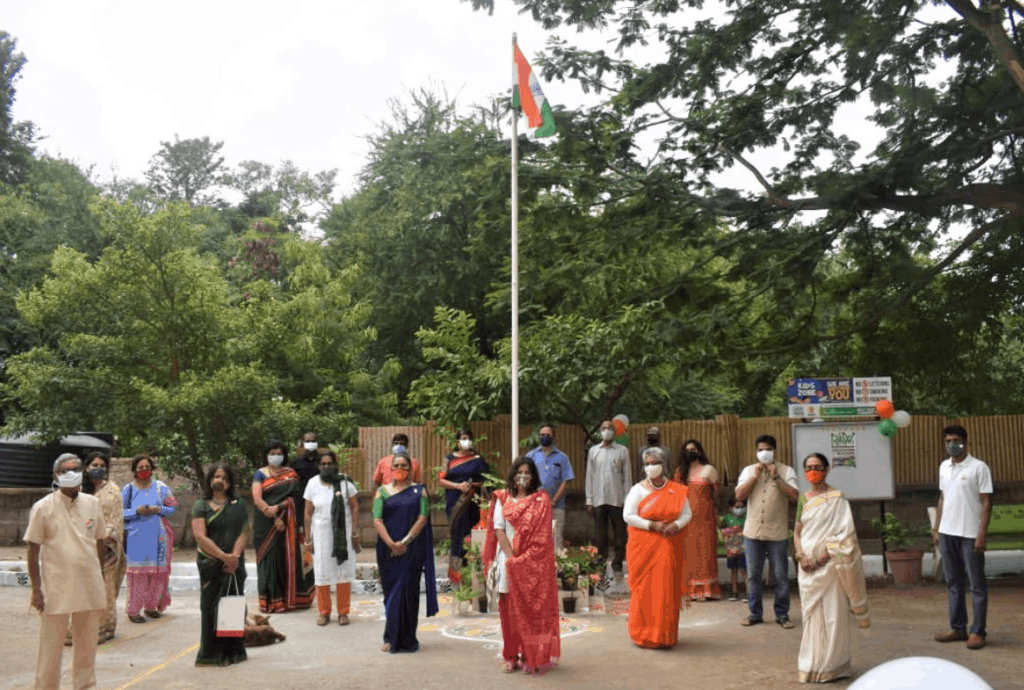
The RWA created an online grocery order and delivery system. It took a couple of days to regularise, but eventually it streamlined beautifully. The system ensured that the vegetable and fruit vendors delivered supplies at the doorstep. People willingly complied. For senior citizens living alone, groceries and essentials were arranged to be delivered at their doorstep. Senior citizens and children were asked not to step out of their homes.
Many enterprising citizens started home cooked food kitchens — this was a huge success. Some still continue to provide that service. One resident stitched and sold 1,000 masks. Another resident, a relative of a pharmacy owner, made medicines available to the community smoothly. The security staff in the RWA jurisdiction were provided with cooked food and essentials, as many of them stayed on site. A mobile ATM kiosk was brought to our area, to facilitate cash transactions for citizens.
Read more: Locked down, but not out: Women entrepreneurs in Ahmedabad
The importance of testing was reiterated often and multiple COVID testing camps were conducted with the help of BBMP. A data bank of some volunteers was set up with the idea of “one day volunteers”. These volunteers would devote an hour or two every day for COVID duties.
Till date, the importance of masks and social distancing is reiterated. With all these measures in place, the community has reported only 22 cases since COVID hit the city.
Anjali Bhate of Rustombagh Association for Welfare (RAW) says, “it’s because of the efforts the numbers have been low. RAW is proud to share that not a single positive case since January 2021 has been reported and we will vow to keep the community safe until every single person in the city is vaccinated.”
Volunteering time to save lives
Vinod Jacob, Founder of Change Makers of Bengaluru, organised over 20 awareness campaigns especially in the crowded parts of the city along with BBMP marshals and officials.
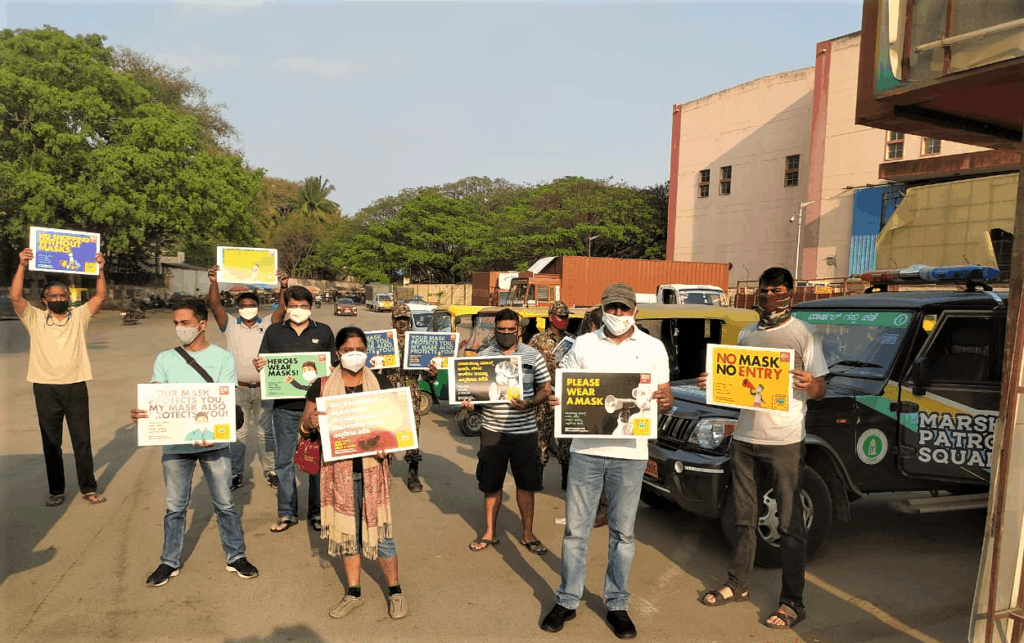
Vinod asks, “how much can the marshals do?” Despite their dedicated efforts, we see so many people with their masks down, talking loudly in public spaces. “We decided to hold these awareness campaigns in crowded spaces and in the hope that people will respond better to communication and appeals from fellow citizens,” Vinod says.
Read more: Citizens team up with BBMP to get Bengalureans to mask up
In the Mini Forest Park locality, Gayatri Balaji, also the CEO of NanoBI Analytics, along with other residents have initiated awareness measures. The community has been religiously telling every unmasked person to mask up, with a smile and a please. “If you don’t stand up for your own safety, who else will?” says Gayatri.
Several other citizen volunteers have been doing the same in their respective wards.
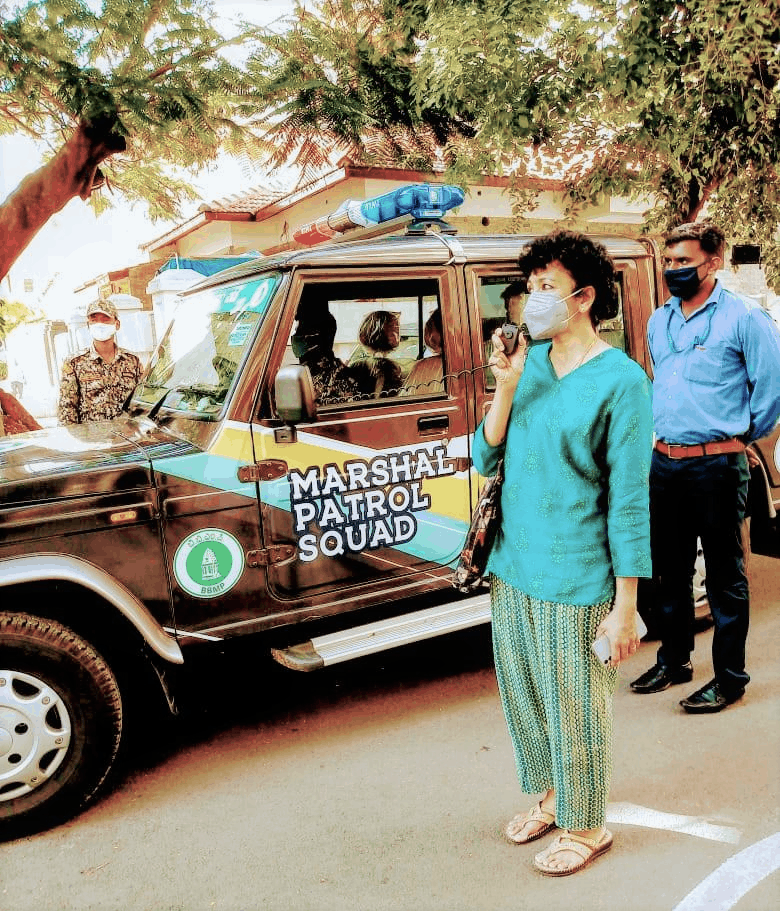
Gayatri says, “Collectively we must have requested at least 3,000 people over the last many months to mask up. Many people respond positively however an equal number don’t listen as well. Wearing a mask is the most basic courtesy one can extend to people around in these grave times. However it is appalling to see the general apathy in this regard.”
Taking the ward committee route
Some citizens have taken the masking up charter to their ward meetings. Priya Chetty Rajagopal, an entrepreneur and Ward Committee Member (Ward 93) has been steering the discussions and initiatives to encourage people to wear masks.
“Masking up protects us and others. It’s simple insurance. We have a chance to save a life and why wouldn’t we?” Priya asks.
The ward committee is an interesting microcosm of how the mask up campaign should be run across the city. In Bengaluru’s 193 wards, with hands-on nodal officers and committed members of the ward committees it would be easy to drive it.
“With our Model Ward initiative for Ward 93 with BBMP Commissioner Manjunath Prasad as our nodal officer, we have made efforts to ensure that masks are both encouraged and implemented as far as possible,” says she.
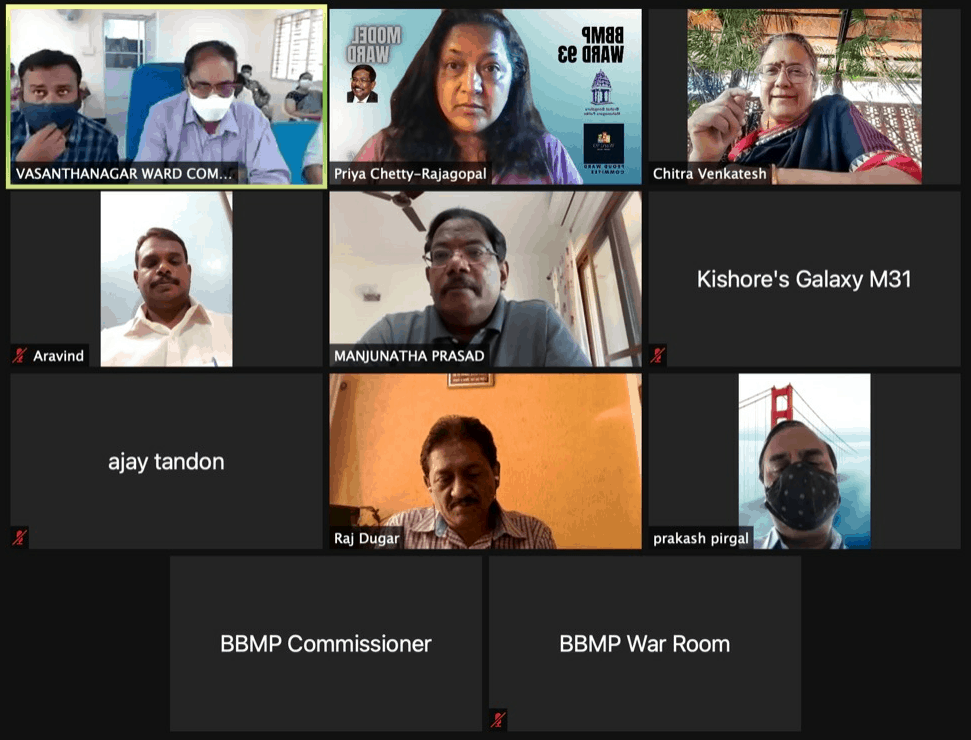
Priya adds that “what is even more important is that citizens must take proactive steps to fight the pandemic. For example, in Cubbon Park we not only interacted very closely with the Horticulture Department but ensured that we made the placards and boards requesting for masks, social distancing and put them up at all entrances. We know this made a big difference. In addition, citizens took up the role of park marshals in supporting the over burdened security guards to speak and to question mask-less and physically non-distant people in the park.”
Running the business, safely
The F&B industry has been badly affected by the pandemic with many of them pushing for opening up and to operate at full capacity. However many restaurants have been circumspect and extra responsible as they opened their doors to customers.
Infinitea, a tea room and tea store, have taken the path of “mindful cooking”. The pandemic has made them more accountable for the health and safety of its customers and employees.
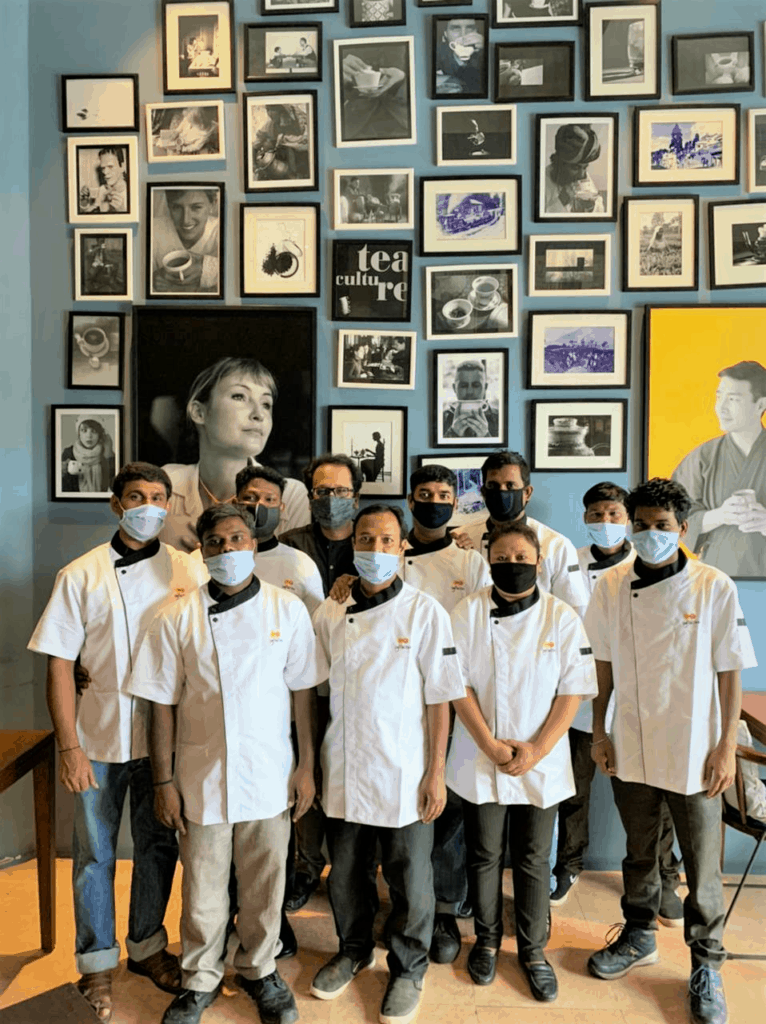
Gaurav Saria, owner of Infinitea, shares how they made the place COVID safe. “We practised sanitising and temperature checks, for both employees and customers, stringently. But we consciously decided that we would convert tables of six into tables of four to ensure there is social distancing between customers. This brought down our capacity from 70 seats to 40 seats. Without offending the customers, we also do subtly tell them to stay masked while they wait for their order. Lives are at stake here and we will continue to do our bit to stop the spread,” Gaurav says.
Read more: Unlock 1.0: Are safety measures in Bengaluru restaurants, shops adequate?
Apartment management aggregators as messengers
Recent super spreader events at large apartment complexes has egged the Public Health Action Team (PACT) to rope in apartment society management aggregators ADDA and MyGate to support BBMP.
San Banerjee, Founder of ADDA says, “The pandemic is far from over and the RWAs play a pivotal role in sustained enforcement of precautionary measures. The least ADDA can do as a platform for communities is to ensure timely dissemination of advisories from the administration to RWAs and residents.”
Srinivas Yelandur, CEO of Elephant Ear Advisors and Co-founder of PACT explained how ADDA is a community platform for apartments and My Gate a facilities management platform for apartments. “Both have been roped in to drive the message of caution and ensure that several RWAS and apartment associations participate at a micro level to ensure COVID guidelines are adhered to,” Srinivas says.
Vijay Arisetty, CEO of MyGate shared that they ensure that the “latest and urgent appeals from BBMP” reach the RWAs and communities.
Fortifying a campus, IIM-B style
With over 1,500 people on campus and over 200 people who visit the campus every day, IIM-B has created a tight system which only saw 15 positive cases since March 2020 and zero fatalities.
Professor Rajendra K Bandi, Dean of Administration at IIM-B explains their “tight bubble”. “During the thick of the pandemic, people were not allowed to step out or get delivery agents in. A system for an in house grocer 2-3 days a week was set up. Key functionaries of the campus were given accommodation on campus. This helped regulate movement in and out of the campus,” Professor Rajendra says.
The students returning from their home towns are mandatorily being tested and quarantined. During the peak of COVID cases, professors were asked to address their students virtually from the confines of a bare classroom.
Many students from rural areas who did not have good connectivity were brought back to the campus, after testing and quarantine, and were asked to take the classes online and from the hostel rooms, the Dean of Administration explains.
When cases were low, a hybrid model of class room- virtual sessions was followed while ensuring at no point more than 20 per cent of the classroom was occupied. Every student in the classroom has a fiberglass chamber around him or her. Masking is compulsory while in the classroom and in common areas.
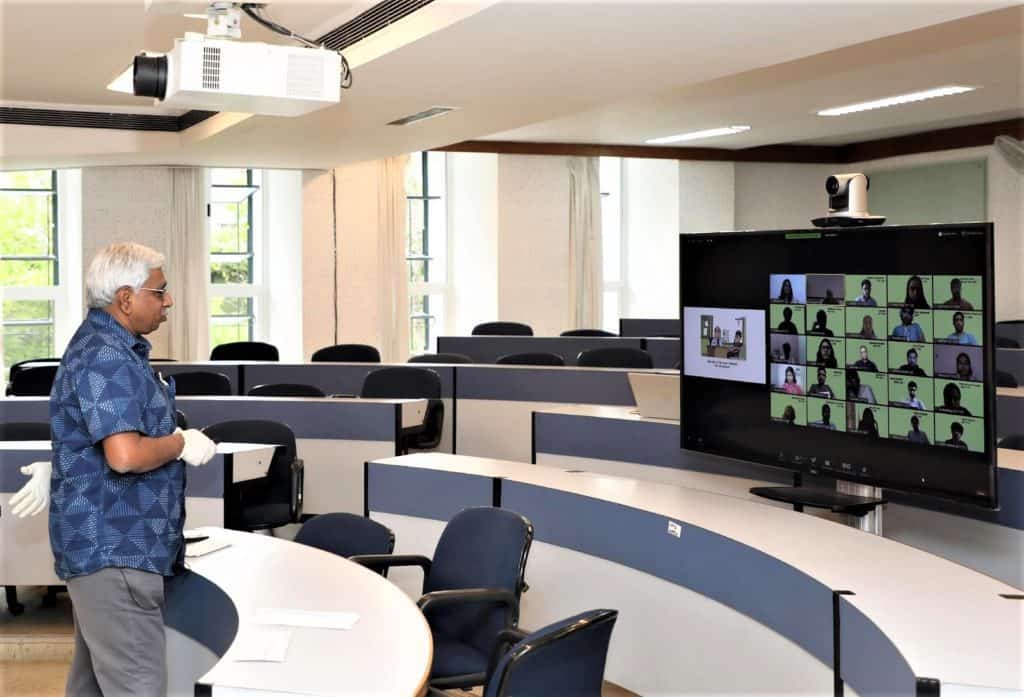
Partnership with BBMP has been seamless. Intense testing every Wednesday continues to be a practice. Besides this, creating open and robust communication channels has helped the regulations succeed without much resistance from residents.
Read more: Covid-19 pandemic isn’t over yet, stay safe: Epidemiologist Giridhar Babu
Every new person visiting the campus is screened by a health officer on campus before being allowed inside. IIM-B plans to keep these measures up until the infection rates in the city are down to zero.
“The pandemic isn’t over”
The government’s ease of index recently judged Bengaluru to be the most livable city in the country. Citizen involvement in the city is exceptional and welcome by the administration. This fine and seamless partnership could be one of the factors which makes Bengaluru an extremely accessible and livable city.
Now is not the time for complacency; with the infection rate picking up in the city we need to tighten our belts until we achieve zero positivity rate in the city.
BBMP Special Commissioner Randeep D says, “Given the pandemic, the last year has been abnormal and has put undue pressure on the GoK and BBMP. However, we have taken reasonable efforts to manage the situation to the best of our abilities and we are thankful for all the support and collaboration that came our way from citizens.”
The Special Commissioner also reiterated that “the pandemic is not over and that people should continue to remain masked and practise physical distancing until told otherwise.”
Wonderful article very well explained most of the aspect in a simple manner.